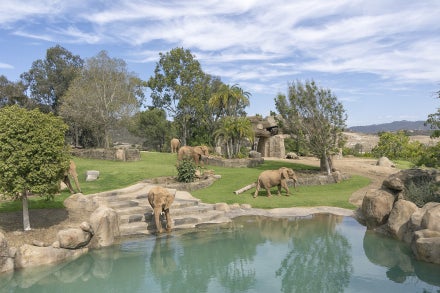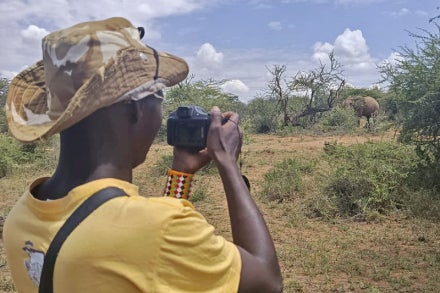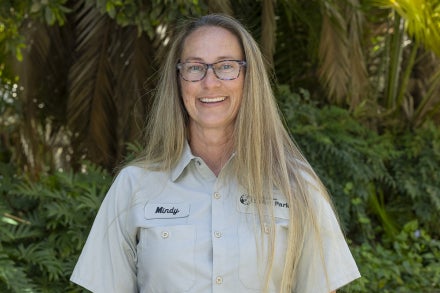
Collaboration is part of our core identity at San Diego Zoo Wildlife Alliance: the term Alliance in our name represents our priority to work inclusively with conservation allies around the world. We collaborate with people, communities, corporations, nonprofits, and governments—all of which share a commitment to safeguard biodiversity and protect the health of our planet. We approach our efforts with the understanding that we can only achieve effective and sustainable conservation action by working together. Our network of global conservation partners makes it possible to create a world where wildlife, people, and ecosystems thrive. Here’s a look at just some of these collaborations.
We support and empower local people and leaders in community-led conservation, so that together we can protect biodiversity while elevating community needs and goals.

Chui Mamas (“Leopard Mothers”) is a community-based women’s organization founded and led by local women in Northern Kenya. We are partnering with Chui Mamas and Loisaba Conservancy to build the Chui Mamas Center, a headquarters for over 300 women from the surrounding community conservancies. The center will support local enterprise and conservation planning, which will enhance both capacity and income opportunities linked to wildlife and habitat conservation.

Lion Governors is a program created and led by our partner Ewaso Lions. The program is designed to empower elders of Kenya’s Samburu communities to mentor younger men in lion coexistence and conservation, creating conservation continuity through generational knowledge and skill transfer, as well as engagement in conservation across age sets. We support Lion Governors as they respond to lion conflict, monitor the cats, and stimulate inclusive dialogue around lion conservation.
By partnering with academic institutions, we combine our diverse skills, expertise, and resources to advance dynamic conservation projects.

We partner with UC Davis’ California Mountain Lion Project to address modern threats to mountain lions, including the growing interface with people. Together, we are developing noninvasive methods to safely deter mountain lions from livestock, pets, and people—thus protecting both human and animal lives and promoting coexistence with wildlife. At the San Diego Zoo Safari Park, 1,000 acres of native sage scrub habitat is a Biodiversity Reserve on which we monitor and learn about mountain lions; we leverage our expertise in wildlife movement, tracking, and behavior to measure the needs of wild cats and their adaptability to shared ecosystems.
We partner with teachers and students to inspire interest in conservation through scientific and culturally relevant curriculum.

We partner with schools on Hawai‘i Island for the ‘Alalā Reintroduction Community Inquiry Program, which empowers students to ask and investigate original questions focused on the ‘alalā (Hawaiian crow). The program not only equips teachers with conservation education resources, but it also enhances students’ critical thinking skills and interest in STEM and conservation careers.

Our Teacher Workshops in Conservation Science—based in Hawai‘i and in San Diego—engage formal and informal educators in a free professional development program. During these workshops, we partner with educators to bring conservation into the classroom, making biodiversity relevant in the lives of teachers, students, and their communities. We have welcomed more than 1,700 national and international teachers since 2006, reaching more than 1 million students worldwide.
We collaborate with governments to safeguard species and ecosystems through collaborative research as well as strategic monitoring and action plans.

Our teams contributed to the development of the official jaguar monitoring protocol to be used by the Peruvian national parks service (Servicio Nacional de Áreas Naturales Protegidas por el Estado, also known as SERNANP) within Tambopata National Reserve, Peru. Together with SERNANP, we have also launched a human-jaguar coexistence survey to study the interactions between jaguars and thousands of people in rural Amazonian villages. This survey is the largest-ever of its kind and will provide us with crucial information for developing strategies to reduce conflicts with jaguars, benefitting jaguar conservation, communities, and surrounding wildlife.
Working with a broadscale network of international partners, we contribute to worldwide efforts to exchange learnings and galvanize conservation action, while also engaging people across sectors and communities in the preservation of wildlife.

We collaborate with hundreds of scientists and wildlife professionals around the world through the International Union for Conservation of Nature (IUCN) Species Survival Commission. Our team serves on, and partners with, multiple Specialist Groups, ranging in taxa (including orchid, crocodile, and bear) and theme (such as animal biobanking and conservation planning). These partnerships magnify our collective impact by enabling us to share knowledge and synergize our approaches.

Our partnership with Reverse the Red ignites cooperation to halt biodiversity decline. As an executive committee member, San Diego Zoo Wildlife Alliance is helping guide collaborators to achieve conservation goals. Together with our partners, we gather and exchange tools to drive conservation optimism and encourage participation in saving wildlife around the world. The support of allies like you makes it all possible!




